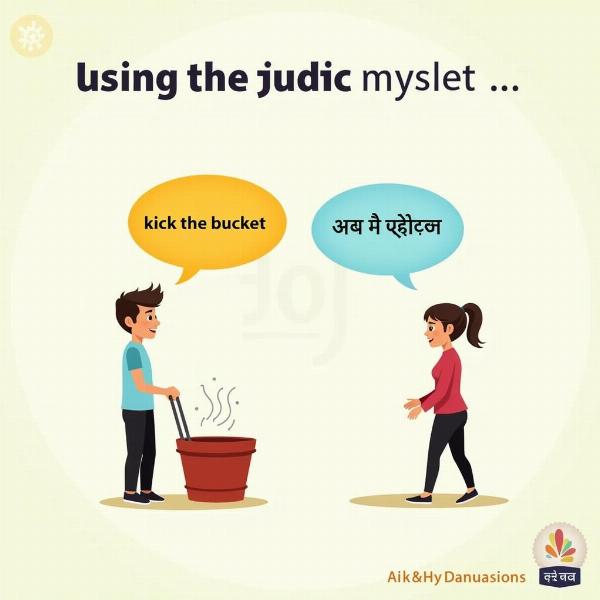“Kick the bucket” is a common English idiom that refers to dying. While seemingly lighthearted, it’s crucial to understand its meaning and appropriate usage, especially when communicating with Hindi speakers. This article explores the meaning, origins, and Hindi equivalents of “kick the bucket,” providing you with the cultural context to use it sensitively and accurately.
What Does “Kick the Bucket” Actually Mean?
“Kick the bucket” is a colloquialism, meaning it’s informal and used in everyday conversation. It’s a euphemism for death, used to avoid the directness of the word “die.” While the phrase’s origins are debated, its meaning is clear: to cease living. Understanding this is crucial for effective communication, particularly when translating or interpreting.
Hindi Equivalents of “Kick the Bucket”
Translating idioms directly can often lead to confusion. While there isn’t a single perfect Hindi equivalent of “kick the bucket,” several phrases convey similar meanings:
- स्वर्ग सिधारना (Swarg Sidharna): This literally translates to “depart for heaven” and is a respectful way to refer to death, particularly in religious contexts.
- दुनिया से चले जाना (Duniya se chale jaana): Meaning “to leave the world,” this is a more general and less formal expression for death.
- प्राण त्याग देना (Pran tyag dena): This translates to “to give up one’s life” or “to breathe one’s last.” It’s a more formal and sometimes literary expression.
- मर जाना (Mar jaana): This is the most direct Hindi translation of “to die,” and while accurate, it can be considered blunt or insensitive in certain contexts.
The appropriate choice depends on the context, the relationship with the deceased, and the social setting.
 Hindi Equivalents for Kick the Bucket
Hindi Equivalents for Kick the Bucket
When (and When Not) to Use “Kick the Bucket”
While “kick the bucket” is widely understood in English, its informal nature requires careful consideration. Avoid using it in formal settings, such as obituaries or condolences. It’s more suitable for casual conversations or when discussing fictional scenarios. When speaking with Hindi speakers, consider using a more appropriate Hindi equivalent to avoid misinterpretations.
Why Do We Use Euphemisms for Death?
Death is a sensitive topic across cultures. Euphemisms like “kick the bucket” provide a way to discuss death indirectly, softening the emotional impact. They can also offer a sense of humor or detachment in certain situations.
Expert Insight: Dr. Anjali Sharma, Linguist
“Idioms like ‘kick the bucket’ reflect the human tendency to use indirect language for uncomfortable topics. They offer a culturally specific way to navigate sensitive conversations.”
Kick the Bucket: Origin Theories
The origin of “kick the bucket” remains uncertain, with various theories circulating. Some suggest it relates to the act of hanging, where a person would kick a bucket away from under their feet. Others propose it relates to the slaughtering of pigs, where a beam (“bucket”) was kicked by the animal during the process. While the true origin is unclear, understanding these theories offers a deeper insight into the idiom’s evolution.
Conclusion: Using “Kick the Bucket” Wisely
“Kick the bucket” means to die, but its informal nature requires careful consideration. While appropriate in casual settings, using respectful Hindi alternatives when communicating with Hindi speakers demonstrates cultural sensitivity. Understanding the meaning and usage of “kick the bucket” allows for effective and respectful communication across cultures.
FAQ
- What does “kick the bucket” mean in Hindi? There is no single direct translation, but phrases like स्वर्ग सिधारना (Swarg Sidharna) or दुनिया से चले जाना (Duniya se chale jaana) convey similar meanings.
- Is it okay to use “kick the bucket” in formal settings? No, it’s considered informal and insensitive in formal contexts like obituaries.
- Where did “kick the bucket” originate? The exact origin is uncertain, with theories ranging from hanging to pig slaughtering.
- What are some other English idioms for death? Examples include “pass away,” “bite the dust,” and “meet one’s maker.”
- Why are euphemisms used for death? They soften the emotional impact and provide a less direct way to discuss a sensitive topic.
- What is the most respectful way to refer to death in Hindi? स्वर्ग सिधारना (Swarg Sidharna) is often considered respectful, especially in religious contexts.
- What is the literal translation of दुनिया से चले जाना (Duniya se chale jaana)? It translates to “to leave the world.”
Meaning-Hindi.in is your trusted partner for professional Hindi translation services. We specialize in a wide range of translation needs, from business and legal documents to technical manuals and website localization. Our expert linguists ensure accurate and culturally sensitive translations for all your requirements. Contact us today for a free quote! Email: [email protected], Phone: +91 11-4502-7584. Meaning-Hindi.in offers high-quality, professional translation services to help you bridge the communication gap.